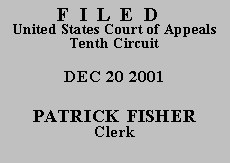

| CURTIS VANE MOORE, |
|
| v. | |
| GLYNN BOOHER, Warden,
Respondent-Appellee.
|
Curtis Vane Moore, a state prisoner in the custody of the Oklahoma Department of Corrections proceeding pro se, seeks to appeal the district court's order dismissing his petition for a writ of habeas corpus filed pursuant to 28 U.S.C. § 2254. We agree with the district court that three of Mr. Moore's claims are barred by the statute of limitations. We further conclude that Mr. Moore's fourth claim is precluded by a factual finding of the state court. As a result, we concluded that Mr. Moore is not entitled to a certificate of appealability.
In order to receive a certificate of appealability, Mr. Moore must make "a substantial showing of the denial of a constitutional right." 28 U.S.C. § 2253(c)(2). He may make this showing by demonstrating that the issues that he raises are debatable among jurists, that a court could resolve the issues differently, or that the questions presented deserve further proceedings. See Slack v. McDaniel, 529 U.S. 473, 483-84 (2000).
The record indicates that, on March 12, 1997, in the District Court for Oklahoma County, Mr. Moore pleaded guilty to Grand Larceny After Former Conviction of Two or More Felonies. Initially, the court sentenced Mr. Moore to the nightime incarceration program in the Oklahoma County Jail. Mr. Moore failed to complete that program, and, as a result, the Oklahoma County Court sentenced him to twenty years' imprisonment.
Mr. Moore did not seek to withdraw his guilty plea within the ten-day period provided by Oklahoma law. See Okla. Ct. Crim. App. R. 4.2(a), Okla. Stat. tit. 22, Ch. 18 App. (2001). He also did not file a direct appeal of his conviction or sentence.
However, Mr. Moore did file three applications for post-conviction relief, on December 18, 1998; June 8, 1999; and March 28, 2000. The Oklahoma County District Court denied the first application, and Mr. Moore did not file a state court appeal. Mr. Moore withdrew the second application, and the third application was denied by the Oklahoma County District Court. Mr. Moore did appeal the denial of the third application, and the Oklahoma Court of Criminal Appeals affirmed the denial.
Mr. Moore filed the instant petition in the federal district court on January 18, 2001. He alleged that: (1) he was coerced into entering a guilty plea and was thereby denied his right to a fair trial; (2) the state court violated the constitutional prohibition of double jeopardy by resentencing him after he failed to complete the nighttime incarceration program; (3) his counsel was ineffective; and (4) the state and his defense counsel coerced him into withdrawing his second application for post-conviction relief.
Applying the one-year statute of limitations set forth in 28 U.S.C. § 2244(d)(1)(A) (part of the Anti-Terrorism and Effective Death Penalty Act, AEDPA), the district court concluded that Mr. Moore's first three claims were untimely. The court reasoned that Mr. Moore's conviction became final on March 22, 1997, ten days after the pronouncement of his judgment and sentence, and that he therefore had until March 22, 1998, to file a federal habeas corpus action.
The court rejected Mr. Moore's argument that his right to file a federal habeas corpus action did not arise until, on March 9, 1999, the Oklahoma Court of Criminal Appeals issued Stewart v. State, 989 P.2d 940 (Okla. Crim. App. 1999), overruled on other grounds by King v. State, 29 P.3d 1089 (Okla. Crim. App. 2001).(1) It reasoned that Stewart did not remove an impediment to the filing of a federal habeas action and that it did not create a new factual predicate for his claims that would extend AEDPA's statute of limitations. See 28 U.S.C. § 2244(d)(1)(B), (D). The court also concluded that Mr. Moore was not entitled to equitable tolling of the limitations period.
The court denied Mr. Moore's fourth claim on the merits. It reasoned that Mr. Moore had no constitutional right to state post-conviction relief or post conviction counsel.
We agree with the district court's application of AEDPA's statute of limitations. As to his first three claims, Mr. Moore filed his federal habeas petition after the expiration of the one-year limitations period. The issuance of the Oklahoma Court of Criminal Appeals's decision interpreting state sentencing law did not extend AEDPA's statute of limitations, and Mr. Moore has failed to establish the "rare and exceptional circumstances" in which equitable tolling is warranted. See Gibson v. Klinger, 232 F.3d 799, 808 (10th Cir. 2000) (internal quotation marks omitted).
As to Mr. Moore's fourth claim, we note that the Oklahoma County District Court found that he was not coerced into withdrawing his second post-conviction application. See Rec. doc. 7, Ex. I, at 4. Mr. Moore has failed to establish that that finding is incorrect. See 28 U.S.C. § 2254(e) (stating that "a determination of a factual issue made by a State court shall be presumed to be correct" and that the petitioner has "the burden of rebutting the presumption of correctness by clear and convincing evidence").
Accordingly, we GRANT Mr. Moore's application to proceed in forma pauperis, DENY Mr. Moore's application for a certificate of appealability, and DISMISS this appeal.
Entered for the Court,
Robert H. Henry
Circuit Judge
*. This order and judgment is not binding precedent, except under the doctrines of res judicata, collateral estoppel, and law of the case. The court generally disfavors the citation of orders and judgments; nevertheless, an order and judgment may be cited under the terms and conditions of 10th Cir. R. 36.3.
1. Stewart held that the sentencing court lacked authority to impose "a hybrid sentence" incorporating "certain elements of a deferred judgment and a suspended sentence into a sentence of nighttime incarceration." 989 P.2d at 944.